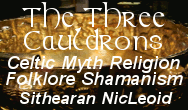Pagan Paths
Explore the way that the Christian Myth and the ‘Path of the Wise’ intertwine into a path of wisdom and action in the worlds.
The Origins of our beliefs
I walked into a convenience store a few weeks ago and made a startling discovery. I must have walked by that store a hundred times, but I had no idea that it held one of the greatest selections of magazines and newspapers in the area. As I browsed, I was astonished to see the face of the Black Madonna staring back at me.
For those of you who read French, the hors-series edition of Sciences et Avenir (Science and the Future), January-February 2013, is an absolute gem.
https://www.epresse.fr/magazine/sciences-et-avenir-hors-serie/2013-01-01
Its main theme is on the origins of our beliefs, celebrations and superstitions. Of course, 'our' refers to the Christian beliefs, since this is a French publication. The main editorial made the point that in fact, there are no authentic Christian celebrations. They all stem from Pagan feasts and practices. Archeologist Yvonne de Sike, in her editorial entitled 'Pagan Midnight' (which is a reference to a French Christmas carol called Minuit Chrétien or Christian Midnight), argues that the so-called lost meaning of the Christian aspect of Christmas, is in fact a revival of the need to reconnect to the sacred rituals that we have been celebrating since the dawn of time. It is the need to re-connect to light and celebration, to look at the sun as the source of vital energy necessary for our survival. She goes on to say that all our celebrations, from Easter to All Saints, are an expression of our desire to dance to the rhythm of the seasons and to reconnect to the Earth and our primal instincts. Meanwhile, she adds, the Church has incorporated these celebrations to better manipulate the masses and herd them into the Christian faith. Ancient gods and goddesses became saints, sacred trees magically became the sites of miracles. And we started to forget our connection to the Land and to the Great Spirit that sustains all.
Celebrations have always been a means to sustain us, protect us and for us to give thanks. We celebrate because we need to. It is essential to our survival. In spite of the politics and the propaganda of fear and guilt that organized religion would like to instil upon us, we still celebrate the same things we always have. It is our deepest yearning.
The more I walk this path, the more I see that there really isn't a purely Christian celebration. We celebrate universal themes. Paganism shaped Christianity. If indeed the goal of medieval Christianity was to suppress and eradicate Pagan expression, it is clear to me that it never succeeded. The proof is in the fact that we still celebrate Pagan celebrations. Christian celebrations are pagan!
I didn't need Sciences et Avenir to tell me this. But the fact that it is telling to the rest of the world gives me great hope.
Comments
-
 Thursday, 23 May 2013
Thursday, 23 May 2013Yes, I think the religious landscape in Quebec is quite particular in North America. The fifties ushered us into a 'Quiet Revolution' where most Quebecois people decided to turn away from practicing the Catholic religion. This was largely due to the power the Church had over the institutions and the mentalities of the time. This might explain a little bit the context in which I grew up where adherence to the religious 'establishment' was no longer wished for or sought. It was a much more open religious framework than what may be found elsewhere. This being said I am saddened to witness that the rejection of the Catholic Church has led to an abandonment of all things spiritual in many cases. I find that people are finding it difficult to reconnect to Spirit because they have lost touch with the 'language' of ritual. It was announced just this week that the province is about to launch hearings on the secularization of Quebec. We'll have to see where this will go. But my whole practice is based on the very clear distinction between organized religion and spirituality and more specifically between the Church as a political institution and the Church as the assembly of those who seek to understand the Christian myth. I fear that too often, people throw away the baby with the bath water.
Blessings! -
Please login first in order for you to submit comments




















Thank you for providing a Quebecois perspective on mainstream religiosity within an important center of the francophone world.